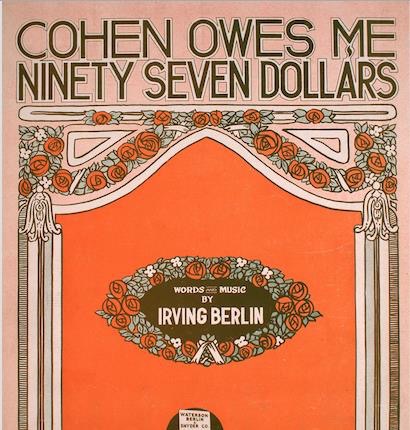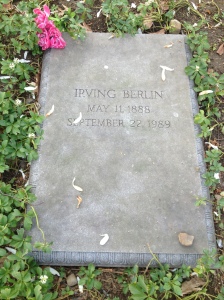It is impossible to overstate how important Irving Berlin (Israel Isidore Beilin, 1888-1989) was to American music in the first half of the twentieth century. He wrote hit songs for over fifty years. If you stop and think of it, given the quicksilver capriciousness of American popular tastes, the feat seems impossible. No one’s ever come close to that range of success. Think about it…ten years, twenty years, yes. But no one stays in style for 50 years! The key to Berlin’s success was that he kept evolving, he kept assimilating new influences and reflecting them in his work, from ragtime to the era of Rogers and Hammerstein. There is no other comparable achievement in American popular song. Everything he ever did was excellent. Almost everything he did was a hit.
Berlin’s role in vaudeville was twofold. One, he was a performer himself in the early days. And two, he wrote songs for so many of the great vaudevillians. His name probably pops up more times in my book No Applause than anybody else’s. By 1924 he had already lived such a life that Alexander Woollcott wrote a biography of him. And he was to live another 65 years!
Born a cantor’s son in Russia in 1888, he came with his family to the U.S. when he was five when their village was burned down in a pogrom. He grew up on the Lower East Side. Early experience included a gig as a singing waiter at “N—-r Mike’s” (where he knew Eddie Cantor), and song plugging for Harry von Tilzer from the balcony at Tony Pastor’s.
He was bitten early by the songwriting bug himself. In 1907 he co-wrote “Marie from Sunny Italy”. Success first came in 1909, with “My Wife’s Gone to the Country”. Also that year, the equally unknown Fanny Brice commissioned him to write “Sadie Salome, Go Home.” For Polly Moran he wrote “Yiddle on the Fiddle” (later sung by Eddie Cantor), “Play some Ragtime”, “Next to Your Mother, Who Do You Love?” For Mae Irwin, he wrote “My Wife Bridget”
When rags caught on, he rode that bandwagon. Get some of these titles: “Stop that Rag (Keep on Playing Honey)”, “Play Some Ragtime”, “Make-a-Rag-a-time Dance Wid Me”, “Draggy Rag”, “That Opera Rag”, “The Whistling Rag”, “That Mysterious Rag”, “The Ragtime Jockey Man”, “Ragtime Soldier Man”, and “Ragtime Violin.”

Though he had started out playing the saloons, by 1911, he was playing Hammerstein’s Victoria. That year, he composed the first song most Americans still recognize, “Alexander’s Ragtime Band”, which became an enormous hit when Al Jolson sang it in The Merry Whirl. Berlin was only 21. “When I Lost You” was written in 1912, inspired by the death of his first wife. In 1914, Belle Baker and Ruth Roye both sang Berlin songs on the same bill at the Palace. That year, he completed his first full-length theatrical score, Watch Your Step, for Vernon and Irene Castle. On May 15, 1915 at the Palace an all-time, all-Berlin record was set when three acts plus the orchestra did Berlin numbers, and then Berlin himself was called to the stage to perform.
Berlin did his bit in World War I, enlisting in the army, where he wrote and produced the show Yip! Yip! Yaphank! which contained the hit “Oh, How I Hate to Get Up in the Morning”. In 1919, Eddie Cantor made a hit of “You’d Be Surprised”. The early 20s saw a collaboration with former Cohan partner Sam Harris, resulting in the construction of the Music Box Theatre, and several editions of The Music Box Revue, all penned by Berlin. In 1925, he wrote the score for the Marx Brothers second full-length stage vehicle The Coconuts. The one song cut from the show (at George S. Kaufman’s behest) was to become a hit on its own “Always.” Berlin also collaborated with Flo Ziegfeld. The Follies unofficial theme song “A Pretty Girl is Like a Melody” was written by Berlin. The Berlin classic “Blue Skies” was written for Belle Baker to sing at the 1926 Follies. The following year, he compose the entire Follies score.
His long Hollywood career began in 1928 with the score for the Jolson pic Mammy. In 1929, he wrote the title song for the Harry Richman picture Putting On The Ritz.
He did several scores for Fred Astaire and Ginger Rogers films in the 30s: Top Hat (featuring “Cheek to Cheek” and the title song “Top Hat, White Tie and Tails”), Follow the Fleet; and On the Avenue. 1927 saw the release of the film Alexander’s Ragtime Band. Stage shows from the 30s included Face the Music (1932) and As Thousands Cheer, which yielded the hits “Heat Wave” and “Easter Parade.”
In 1938, Kate Smith introduced his song “God Bless America” on the radio for an Armistice Day broadcast. He had written the song during the war for Yip! Yip! Yaphank! but had never quite finished it. The song became an instant standard. The 1942 films Holiday Inn included the song “White Christmas”. These two songs alone merit Berlin’s inclusion on Mount Rushmore.
The war years saw a grueling tour of a show called “This is the Army” that he took to American troops all over the world. He started in 1942. he did not return until the war was over. The postwar years saw the creation of two more hit shows Annie Get Your Gun (1946) and the film Easter Parade (1947). His first flop was Miss Liberty (1949). Not bad after forty years! He was back on his game the following year with Call Me Madam and a movie of White Christmas. After a twelve year hiatus he re-emerged with Mr. President and was still trying to hustle a film project called Say it With Music in 1969. When he couldn’t get that off the ground, he said to hell with it. After all, he was eighty years old.
Certain of his songs never stopped being hits. After all, “God Bless America” and “White Christmas” are attached to holidays. They are guaranteed annual resurrection. Crazy like a fox! Others like “Top Hat, White Tie and Tails”, and “Putting on the Ritz” are emblematic of an entire era, and aren’t likely to die anytime soon. In the 1970s, a disco version of the latter song hit the charts! When Berlin died in 1989, at age 100, he had lived so long that the copyright to Alexander’s Ragtime Band had become public domain.
And now performing that very song, Mr. Al Jolson:
Mr. Berlin and family are buried at Woodlawn Cemetery. I visited the spot in 2015:

To find out more about vaudeville and great songwriters like Irving Berlin, consult No Applause, Just Throw Money: The Book That Made Vaudeville Famous


[…] the Tin Pan Alley songwriter: the immigrant Rags-to-Riches story we associate with the Gershwins, Irving Berlin and others. But, as Benjamin points out, the years since the mid-twentieth century saw a sort of […]
LikeLike
[…] a staple of the Borscht Belt, occasional Broadway (notably Top Banana with his old burlesque pal Phil Silvers) and television. An interesting artifact of his latter work is Mack and Meyer for Hire, on which he […]
LikeLike
[…] alumni: Groucho Marx, Eddie Cantor, George Jessel, Walter Winchell, Eleanor Powell, Mae Murray, Phil Silvers, Bert Wheeler, Jack Pearl, the Duncan Sisters, Sally Rand – these are just some of them. Edwards […]
LikeLike
[…] only his own songs but those of his many budding apprentices, the most famous of which was to be Irving Berlin. Tilzer’s star burned brightest from 1900 through the World War I era, but he was still […]
LikeLike
[…] private life was so legendary, Peggy’s name wound up in song lyrics by Rodgers and Hart, Irving Berlin, and three by Cole Porter. In the 1928 show Whoopee, Eddie Cantor […]
LikeLike
[…] song with his smooth, pleasant voice (“Fred Astaire puts a song over better than anyone,” said Irving Berlin) and he could act plausibly and charmingly too. To those uninterested in dance, the Astaire-Rogers […]
LikeLike
[…] while keeping him out of trouble. At the same time, she let him pal around with fellow kid performer Phil Silvers because “he’s a good boy”. Silvers brought him to meet his first prostitute. Happy […]
LikeLike
[…] Presentation Houses as long as they lasted. Her greatest legacy is the fact that she introduced the Irving Berlin song “God Bless America” on her radio show on Veterans Day, 1938 and was associated with the […]
LikeLike
[…] keeping him out of trouble. At the same time, she let him pal around with fellow kid performer Phil Silvers because “he’s a good boy”. Silvers brought him to meet his first […]
LikeLike
[…] When she was twelve she went off the air, and had a lean few years playing the Borscht Belt and New England roadhouses. At 15, she stopped being “Baby” Rose Marie. Gradually the club dates began to improve until she was playing the top night spots, and along the way she continued to benefit from relationships with old friends like Milton Berle and Phil Silvers. […]
LikeLike
[…] Famous products of the Gus Edwards mill include: Groucho Marx, Georgie Jessell, Eddie Cantor, Phil Silvers, Walter Winchell, Ray Bolger, Eleanor Powell, Sally Rand, Bert Wheeler, Lillian Roth and the Duncan […]
LikeLike
[…] by the entire industry. Glimpses on how burlesque comedy worked might be gotten from watching the Phil Silvers movie Top Banana or the 1968 film The Night They Raided Minsky’s with Jason Robards. The […]
LikeLike
[…] 1919 his whole philosophy was put to music by Irving Berlin. One of the songs he wrote for the Follies that year “A Pretty Girl is Like a Melody” was to […]
LikeLike
[…] In 1922 they were starring in a revue called The Chuckles of 1922 where they were spotted by Irving Berlin. He brought them back to the states to headline his Music Box Revue. It is their big shot. After […]
LikeLike
[…] composing ragtime causes you to live to be a hundred. Like Irving Berlin, Eubie Blake also managed to hit the century mark, lucid until the end – which was merciful, for […]
LikeLike
[…] were written by George S. Kaufman and Morris Ryskind: The Cocoanuts (1925-28) with music by Irving Berlin, and Animal Crackers (1928-30) with songs by Kalmar and Ruby, including the classics “Hello, I […]
LikeLike
[…] by the Columbia Burlesque Wheel, she commissioned two songs from the then unknown Irving Berlin. One of them was “Sadie Salome, Go Home”. She was a hit in The College Girls in 1910. She […]
LikeLike
[…] could present pacifist playlets in the vaud houses. Once we entered the war, such messages were out; Irving Berlin’s “Over There” was more in keeping with the times. As will happen in wartime, […]
LikeLike
[…] Shore, Patti Page, Peggy Lee, Judy Garland all rolled into one.” Thanks largely to the fact that Irving Berlin supplied her with a lot of her songs, she is closely identified with many of the classics of the […]
LikeLike
[…] a chance to sing with the act in Louisville when the manager needs them to pad for time. He sang Irving Berlin’s “Ragtime Violin” and scored a huge hit, not just for his singing ability, but for his […]
LikeLike
[…] audience. In 1910, he briefly went back to Dockstader, bringing his ragtime with him. Here he did Berlin’s new song “Alexander’s Ragtime Band”, making a hit of […]
LikeLike